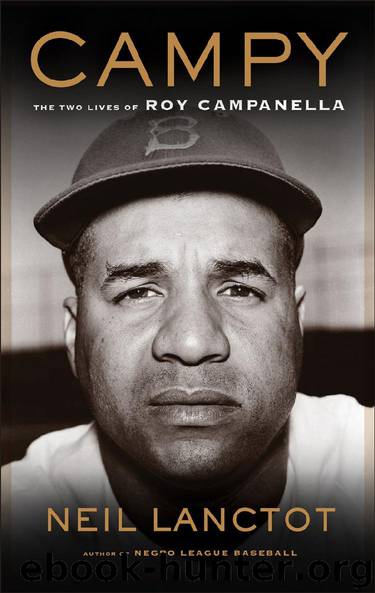Campy: The Two Lives of Roy Campanella by Neil Lanctot

Author:Neil Lanctot
Language: eng
Format: epub
Publisher: Simon and Schuster
14
ACHES, PAINS, AND A COMEBACK
NO SOONER HAD THOMSON touched home plate than the Dodger switchboard was jammed with near-hysterical callers screaming, “Lemme talk to that blankety-blank O’Malley [or Dressen or Bavasi] or anyone else.” Others channeled their frustrations into creating effigies of Dressen to be abused appropriately by passersby.
Campy could barely bring himself to leave the Polo Grounds that afternoon. “It was the biggest disappointment of my life in not being able to play,” he sighed. “I just can’t get around to realizing that we lost it.” O’Malley himself believed Campy’s late-season injuries probably cost the Dodgers the pennant. But Roy recognized that the entire team was culpable, even chiding Reese for remarking, “I guess the good Lord just didn’t want us to win it.” “Don’t say that, Pee Wee. Don’t go blaming the Lord for what we should have done.”
After voting on their second-place shares, the Dodgers went home to lick their collective wounds until spring. Campy and Jackie, however, had their usual barnstorming commitments to fulfill. That the two men were now leading separate all-black clubs ( “voluntarily fostering the very thing it took several lifetimes to break down,” scolded Sam Lacy) confirmed conclusively what many had initially been reluctant to believe.
Jackie, his name still box-office gold, proved to be the stronger draw throughout the South. But Campy managed to trump Jackie in a more dramatic way that fall. On October 31 he was informed that he had been elected the National League’s Most Valuable Player. “He was practically yelling, he was so overjoyed,” Ruthe told Lacy. “I think Campy … had just about given up any thought of it after they … lost the pennant.”
Campanella’s 1951 season was undeniably impressive. Despite spending most of the season hitting sixth or seventh, he finished fourth in average (.325), third in slugging (.590), third in OPS (.983), third in homers (33), and fourth in RBIs (108). He was just as superb controlling the running game (admittedly limited in those days), cutting down 34 of 49 runners attempting to steal for a 69 percent success rate, far above the 37 percent average of other National League catchers. And his league-leading 140 games (out of 154) behind the plate reflected an almost unbelievable durability.
Not everyone was thrilled with his selection. One writer, likely more concerned with race than performance, left Campy off the ballot. Others suggested that runner-up Stan Musial, with his usual sterling offensive numbers, was more deserving. Even Jackie Robinson thought Musial would have won the award hands down if the Cardinals had contended. Nevertheless, he admitted that Campy “deserves every honor he can get…. I am convinced that Campanella is the best catcher in baseball today.”
Privately, Robinson had mixed emotions. He had put together what he considered to be his best season: 19 homers, a .338 average, and a league-leading .992 fielding percentage at second base with only 7 errors. Yet he had finished only sixth in the voting. Although he admitted Roy “had done a fantastic job,” Jackie
Download
This site does not store any files on its server. We only index and link to content provided by other sites. Please contact the content providers to delete copyright contents if any and email us, we'll remove relevant links or contents immediately.
| Baseball | Basketball |
| Boxing, Wrestling & MMA | Football |
| Golf | Hockey |
| Soccer |
Imperfect by Sanjay Manjrekar(5871)
Wiseguy by Nicholas Pileggi(5769)
The Body: A Guide for Occupants by Bill Bryson(5079)
Tuesdays with Morrie by Mitch Albom(4767)
Unstoppable by Maria Sharapova(3521)
Not a Diet Book by James Smith(3409)
Crazy Is My Superpower by A.J. Mendez Brooks(3397)
Into Thin Air by Jon Krakauer(3384)
The Mamba Mentality by Kobe Bryant(3261)
The Fight by Norman Mailer(2926)
Finding Gobi by Dion Leonard(2835)
Tuesdays With Morrie by Mitch Albom(2754)
The Ogre by Doug Scott(2678)
My Turn by Johan Cruyff(2621)
Unstoppable: My Life So Far by Maria Sharapova(2500)
Accepted by Pat Patterson(2364)
Everest the Cruel Way by Joe Tasker(2337)
Borders by unknow(2301)
Open Book by Jessica Simpson(2259)
